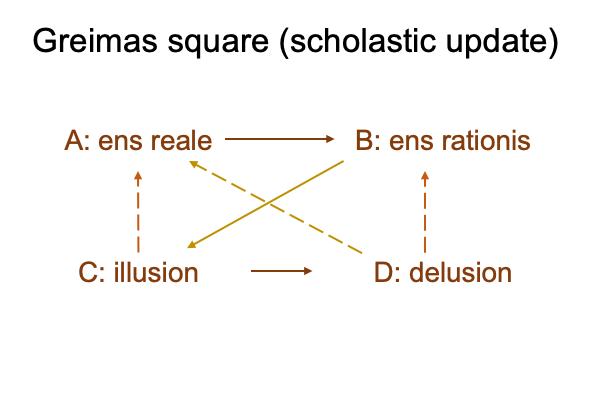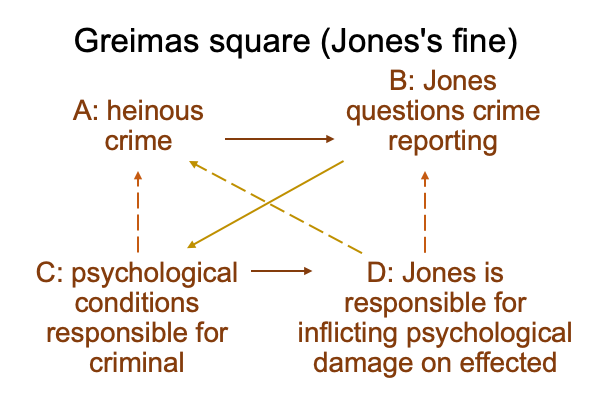0035 Does the Greimas square apply to Jones’s legal conundrum?
Here is a diagram of the updated scholastic debate.

0036 Here are my associations.
A is a real heinous crime.
B is Alex Jones questioning the veracity or “realness” of the event, especially corporate media’s reporting of the event.
C is the fact that the murderer is sentenced to life in prison, rather than the death penalty.
Say what?
The real perpetrator gets life in prison, because he is crazy. His psychological conditions are the mind-independent beings that are responsible for the mind-dependent crime. So, the real criminal is a puppet of a mind-independent being, called “psychological conditions”.
D is a judge fining Jones many many many dollars for the psychological distress of those effected by the crime.
Here, Jones’s mind-dependent questions are regarded as mind-independent causes of the psychological distress of those effected by the crime.

0037 Hmmm. I used all the clues I have. But, this square does not make a lot of sense.
Each association technically fits the rules established in the prior blog.
Still, I cannot quite grasp the idea that the psychological damage inflicted by Alex Jones is anything equivalent to the real damage inflicted by the perpetrator on those effected by the crime. Unless, Jones’s questioning (B) derails an alternate mind-dependent being (B’) that would have evoked an illusion (C’) supporting a very expensive delusion (D’).
0038 Now, that sounds more like it.
If Jones thwarts an alternate Greimas square, then the foiled conspirators take vengeance using the cloak of an implausible legal theory. The questions and concerns of Jones (B) are mind-dependent beings that point to the psychological conditions of the perpetrator of the actual crime (C). Yet, the mild sentence (of life in prison, as opposed to execution) show that the justice system does not regard the criminal responsible for the real crime. Rather, psychological conditions account for the criminal act (C) and the criminal is not really responsible for the heinous crime (C). Jones’s questions (B) actually point in this direction, as well as to other possible conditions.
However, Jones’s questions stand in the way of promoting the one who is really responsible for the crime (C’).
We all know who is really responsible. Don’t we?
0039 The implausible legal theory (D) separates the crime itself from its psychological damages.
In the minds of those effected by the heinous crime, Jones is legally responsible for the psychological consequences of a crime that he did not commit (D).
Or something like that. I am not a lawyer. So, who knows what I am talking about?
Oh, I suppose that I am talking about a conspiracy theory.
Don’t worry. My speculations are purely theoretical. I am merely examining the various implications of associating particular aspects of Jones’s legal drama to the Greimas square.
